HORACE DANN (1896-1958)
by Philip Scowcroft
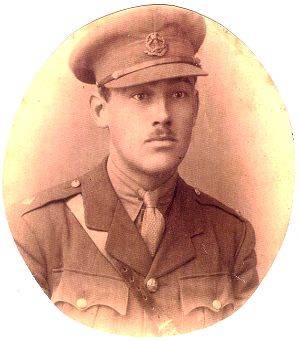 | |
Horace Dann,
Lieutenant, Royal Fusiliers,
Great War
|
|
Few now remember Horace Dann and his
contribution to British (and Commonwealth)
music, but his work as pianist, lecturer,
BBC administrator and, in a small way,
composer, is worth recalling.
He was born on 20 November 1896. His
father (also Horace) was a tenor singer
mostly of ballads, popular in concerts
either side of 1900. Eventually the
young Horace accompanied his father
on the piano and acquired a substantial
knowledge of the song repertoire. I
have seen a programme of a recital by
the younger Horace (assisted by a cellist
and two singers) at Addlestone Village
Hall on 27 January 1913, when he played
Schumann, Chopin, Liszt, Sinding and
a Sonata in A Flat of his own. His surviving
compositions are few in number and mostly
date from his last twenty years. As
we shall see, he did compose other works
but whether these were destroyed by
him as juvenilia or are merely lost
is impossible to say.
By 1912 he was studying at the Guildhall
School with Carlos Sobrino (piano) and
J.D. Davis (harmony). These studies
were cut short soon after the outbreak
of the Great War. He enlisted in the
army, serving first in the ranks with
the Middlesex Regiment and latterly
in the Royal Fusiliers with a commission.
Some of his letters from the front,
to his parents or his sisters, survive,
mostly from the first half of 1916,
with pencilled annotations by Horace,
obviously added at a later date. His
hospitalisation with trench fever meant
that he missed the "big push" on the
Somme which began on 1 July 1916. His
illness was no doubt a stroke of good
fortune for him. Letters after mid-1916
have not survived, so we have no first-hand
evidence of his later military career.
There are some references to music in
the letters we have. He had opportunities
to play the piano at a YMCA hut behind
the lines and he envisaged a composition
"1916" with references to "the dull
boom of the big guns, the chromatic
whistle of flying shrapnel, the angry
scream of trench mortars, the tautologous
'phut' of the maxim-gun and the weird
'ping' of a bullet". There is no evidence
that he completed or even started, this,
but, as we shall see, a later piece
of his was to be inspired by his war
service.
We next glimpse Horace on 30 March
1919 when he appeared at Le Havre in
a Grand Concert in aid of the Régions
Dévastées, with the Band
of H.M. Royal Garrison Artillery and
sundry French artistes. M. le Lieutenant
Dann performed Liszt's Sixth Hungarian
Rhapsody as a piano solo.
After demobilisation he resumed his
interrupted studies, actually at the
Royal College of Music, and it is from
the immediately post-war period that
his prelude Aurora came. This
apparently depicted his impressions
of the battlefield on the eve of the
Armistice (November 1918) and, taken
up as No.15 in Sir Oswald Stoll's series
by young British composers, received
several performances, one at the Coliseum
and others by the LSO and the Queen's
Hall and Royal Albert Hall Orchestras.
In 1921 Horace was appointed Professor
and Lecturer at the Dutch University
of Stellenbosch, Cape Province, South
Africa, where he taught piano (up to
LRAM and ARCM level), harmony, counterpoint,
aural training and musical appreciation.
During his nine years in South Africa
he became Music Director of the African
Theatre Group in Johannesburg, adjudicated
at festivals, accompanied and gave recitals.
One of his lectures, on "Modern Pedal
Technique" was given at the Stellenbosch
Conservatorium in August 1922. Early
in his South African career he appeared
as piano accompanist and soloist with
the soprano Madge Allen, who sang operatic
airs by Handel, Spohr and Puccini, and
songs by Grieg, Dvorak and Horace himself
(two: Love, to Browning's words,
and the Shelley setting, Music When
Soft Voices Die, which, as we shall
see, achieved publication much later).
His piano solos on that occasion included
Chopin and Liszt and three of his own:
Aurora, described as a "Praeludium
Solemnis", the "Ballet fantastique"
"Walpurgis Night", described by
one review as "a wild and fantastic
rhapsody" and Wiegenlied. Walpurgis
Night was criticised by one report
as "far too long" and even Wiegenlied
had "too much repetition". Such
criticisms may explain why these latter
two solos at least have not figured
in Horace's final portfolio of compositions.
Aurora may possibly, in view
of its greater exposure, have been in
a higher league than them, though it
too has not survived and we cannot test
the truth or otherwise of this supposition.
Horace clearly enjoyed South Africa.
He was one of several with English connections
who enhanced the musical life of the
Union, others being Victor Hely-Hutchinson,
W.H. Bell, Gideon Fagan and Dan Godfrey
III, son of the Bournemouth Godfrey.
Horace hankered after returning to the
Union. Early in 1947 he applied for
a lectureship there, unsuccessfully,
even though W.K. Stanton and Sir George
Dyson wrote references for him, and
he was looking forward to a return to
lecture at Stellenbosch when he died
in 1958.
Between 1932 and his retirement in
1957 he worked for the BBC in various
capacities. This was new territory for
him, as in 1932 the BBC was only ten
years old. He began in the balance and
control department, soon being promoted
to be one of the BBC's Directors of
Light Music, in which capacity he was
responsible for administration and programme
research, necessitating much critical
listening, sitting on audition panels
and reporting on home and overseas recordings,
broadcasts and public concerts. He calculated
that music then (we are talking about
the late 1930s) occupied 70% of the
time: 33% light music, 14% symphonic
music, 12% dance music and 10% records.
How different from today! Those percentages
are, one would think, approximately
as the line between light and symphonic
music was, and is, hardly precise. He
naturally came to know many of the light
music greats of that era; nearly forty
of them clubbed together to present
him on his retirement with a set of
Grove's Dictionary (presumably
the 1954 edition) - they included Campoli,
Albert Cazabon, Harry Davidson, Walter
Goehr, Fred Hartley, Jack Leon, Mantovani,
Wynford Reynolds, Troise (whom Horace's
daughter remembers with particular affection)
and Louis Voss. During the war he moved
to the Midland Region as Music Assistant
(to W.K. Stanton) and became involved
with the programmes of the BBC Midland
Light Orchestra, formed in 1941, and
programmes like "Songs for Everybody".
Horace was married twice, once while
in South Africa, to a girl who had nursed
him during an illness and who died after
only a short time after the wedding.
After his return to England he married
(1934) his second wife, Beryl, who outlived
him by thirty years. The union produced
one daughter, Jennifer, born in January
1936. (1) Horace, Beryl and Jenny were
looking forward to living in South Africa.
Horace, who had some history of heart
trouble, was however advised to have
an operation before he went. The operation
was a difficult one (less was known
about heart surgery fifty years ago
than it is today) and sadly led to Horace's
death on 18 December 1958. His funeral
at Golders Green Crematorium (24 December)
was attended by many former BBC colleagues
and artiste friends. Sir Adrian Boult
wrote Beryl a letter of sympathy and
Robert Simpson, then under 40, not merely
did likewise, but composed a gentle
but deeply felt Variations and Fugue
for recorders and string quartet
in Horace's memory, which was performed
at the Wigmore Hall on 9 February 1959
by Carl Dolmetsch (who later wrote Jenny
a characteristically charming letter)
and the Martin String Quartet (2).
It is time for us to return to Horace's
own compositions. Only six, all short,
achieved publication. Two were songs:
the Shelley setting of Music When
Soft Voices Die, which, as we have
seen, dated originally from around 1920.
Publication by Paxton - possibly in
a revised form - came in 1938. It is
stated to be for soprano or mezzo and
piano, but according to the BBC Orchestral
Catalogue the accompaniment was twice
transcribed for orchestra, once for
piano and strings (probably by Horace
himself), once for small orchestra by
Hal Evans, composer of several incidental
scores for BBC drama productions like
A Christmas Carol, The Water
Gypsies and The Four Feathers.
Horace's other song, more probably
describable as a ballad, was Whenever
My Mary Goes By (words by Alfred
Dunning), published by Boosey in February
1950 and was possibly his last composition.
First to be published (by Swan in 1936)
was a piano solo, Lullaby (Berceuse),
though this was orchestrated, probably
by Horace, for a smallish ensemble of
flute, oboe, two clarinets, two bassoons,
two horns and strings. It has a pleasant
lilt. In 1948 came another piano piece,
The Well Tempered Polka (on a
theme from Bach's 48), a pleasant jeu
d'esprit, which eventually achieved
publication by Curwen in July 1952.
The remaining compositions were the
valse intermezzo for small orchestra
(flute, two clarinets, two trumpets,
trombone, strings, harp and timpani),
Prima Ballerina published by
Paxton in June 1938, which appears to
live up to its Capriccioso marking,
and the concert march, Worcester
Beacon, for full orchestra, published
also by Paxton, in April 1946 and performed
in one of the showcase concerts in the
BBC's Festival of Light Music in March-April
1949 (3). I heard this then (though
not since) and was impressed by its
breadth and colourful scoring. It is
very much in the Eric Coates tradition
and perhaps its topographical title
(4) reflects an admiration for Elgar.
My memory of that one performance suggests
that it would be well worth revival,
even recording, if the score and parts
can be found - it is the only one of
these six works that Jenny did not have.
It is perhaps not surprising that at
least four of Horace's six surviving
miniatures (Worcester Beacon,
at 4'30", in the composer's own timing,
is the longest) are light music, when
we bear in mind that he worked for the
BBC during the years when its support
for light music, especially British
light music, was at its peak. It is
perhaps a pity that he did not compose
more; but he was a busy man in other
musical directions and he knew, as well
as anyone, that there were so many other
quality composers in that particular
field to fill that 33% of BBC air time
that we have heard about.
NOTES
1. I am greatly obliged to Jenny for
producing for me so many documents and
memories of her father which have made
this article possible.
2. The programme note of this describes
the music as "though serious and even
elegiac in parts, is by no means funereal
and the Fugue is light in texture, swift
in pace". The recorder player is asked
to use treble and, at the climax, sopranino
instruments but at first he plays a
subsidiary role, the theme being given
to violin or viola. The theme and each
of the seven variations move tonally
from "a D Flat majorish - B Flat minorish
region into E Minor - G Major and back
again". In the turbulent last variation
the sopranino recorder is pitted against
the strings, the music being "pulled
definitely into the key of E". The mainly
quiet Fugue features the sopranino recorder
showing fleetness and delicacy. At the
end the music floats into a slow, gentle,
rather sad, coda that settles at last
in E Major."
3. On the Festival generally, see my
article in the Newsletter of the Light
Music Society, January 1998, pp 4-5.
Dann's march opened a concert by the
Liverpool Philharmonic Orchestra.
4. Strictly this should be "Worcestershire
Beacon".
Recordings
The composer's daughter, Jenny Overton
(Dann) has a 78 of her father's Worcester
Beacon, another of Prima Ballerina and
a recording of the Robert Simpson piece
for Carl Dolmetsch - in memoriam Horace
Dann.
Scores
Dann's two piano compositions are being
looked at for performance at Phil Scowcroft's
series of lunchtime concerts in Doncaster
Museum and the song Music When Soft
Voices Die; the latter probably in 2009.
The parts for Prima Ballerina are being
given to Ernest Tomlinson for his library
of Light Orchestral Music.
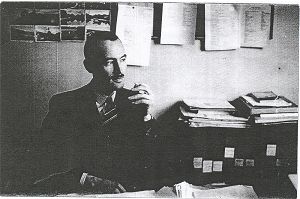
Horace Dann, in his office at the BBC
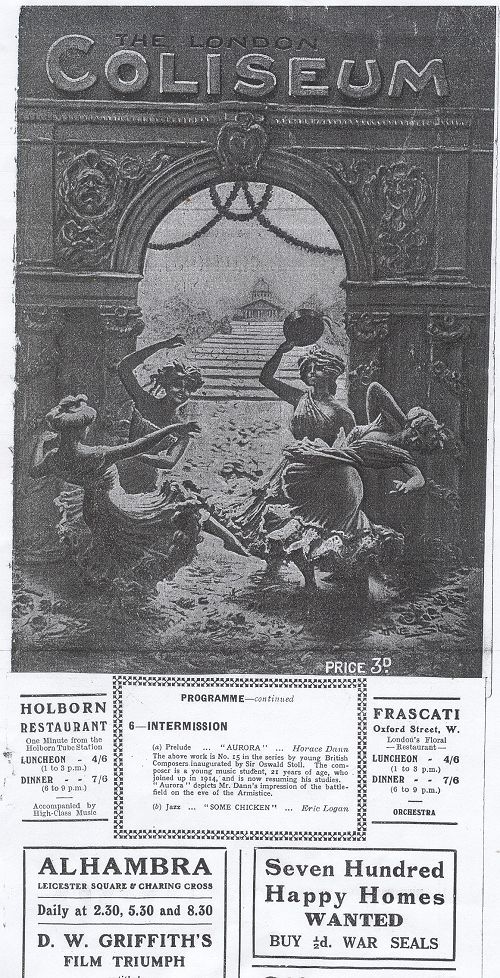
Programme Coliseum (extract) noting
lost composition by Dann
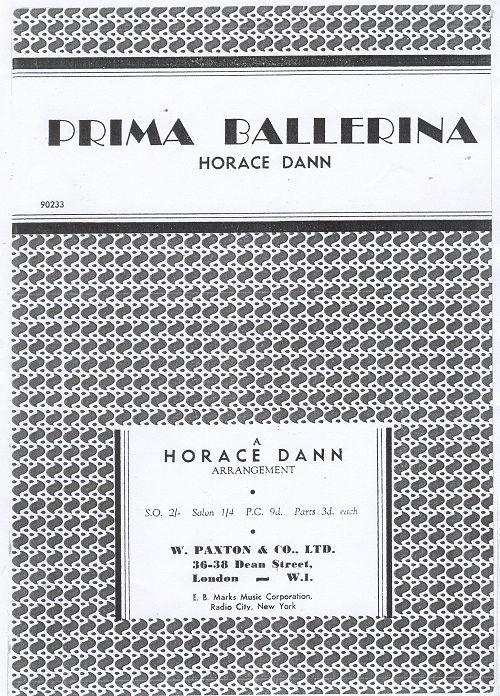
Prima Ballerina - score frontpage
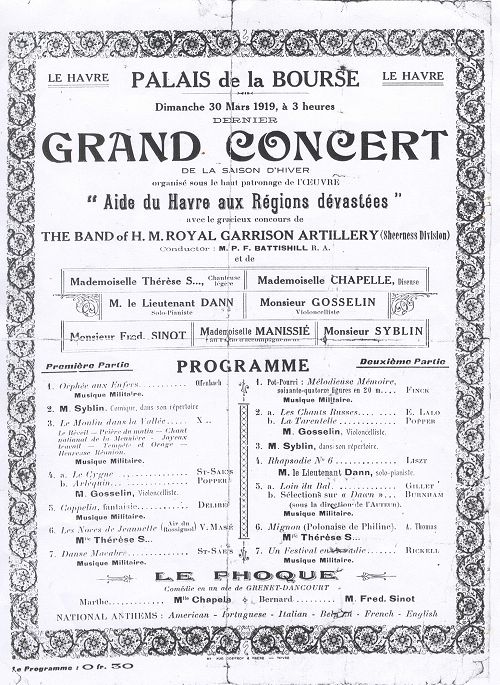
Palais de la Bourse - concert bill
Philip L. Scowcroft
July 2008




 All Nimbus reviews
All Nimbus reviews








